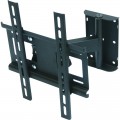Minimum size
The minimum TV screen size that can be mounted on the stand/mount. It is usually indicated for structures with mounts, for stands this parameter is irrelevant (for more details, see "Type"). The parameter is not absolutely accurate, because technically, TVs with a smaller size can fit the mount; however, in general, it allows to evaluate the scope of a particular model of mount/stand.
Max. size
The maximum size of the TV screen that can be installed on the stand/mount. Like the minimum size (see above), it is in some way a conditional indicator — TVs with a larger size can also fit for the mount, and then the main determining parameter will be the maximum weight (see below).
Minimum distance from the wall
The smallest possible distance between the wall on which the mount is hung and its farthest protruding point. First of all, the overall compactness of the design depends on the minimum distance: if you do not want the TV to protrude far forward from the wall, you should pay attention to models with a small minimum distance. And if the mount provides length adjustment, this parameter determines the limits of such adjustment.
Max. distance from wall
The maximum distance from the TV mounting point to the wall (in the case of ceiling mounts, to the ceiling) provided by the mount. See "Minimum distance from wall" for details.
Upward tilt angle
The maximum upwards tilt angle from the vertical of the installed screen. The larger the tilt angle, the wider the adjustment possibilities, however, in fact, an angle of more than 5° is rarely required.
Downward tilt angle
The maximum downward tilt angle from the vertical for the installed screen. As with the upward tilt angle, the larger this angle, the wider the adjustment possibilities; however, downward tilt is usually required more frequently (the TV may be installed under the ceiling), and its angle can be as high as 15-20°.
Turn angle
The angle within which the screen installed on the mount can rotate. Measured from far left to far right. In modern models, it can reach 180°.
VESA
VESA is generally accepted standard for most modern screens (TVs, monitors, plasma panels) and is found in all types of stands/mounts, except for classic stands (see "Type"), where the TV is placed on its own stand. Any such mount has 4 screws arranged in the shape of a rectangle (square). However, the size of this rectangle can be different, it depends primarily on the weight, and, accordingly, the size of the screen. The smallest mount today is
50x50 mm, it is designed for very miniature models;
100x100 mm can already hold TVs of about 24",
200x200 mm — 32", and in larger models, the size of the mount can reach
800x400 mm. Many mount/stand models have holes for several VESA standards.
The following sizes of VESA mounts are currently on the market:
50x50 mm,
75x75 mm,
100x100 mm,
100x200 mm,
200x100 mm,
200x200 mm,
200x300 mm,
200x400 mm,
300x200 mm,
300x300 mm,
300x400 mm,
400x200 mm ,
400x300 mm,
400x400 mm,
500x400 mm,
600x400 mm,
600x600 mm,
700x400 mm,
800x400 mm,
800x600 mm,
800x800 mm,
900x400 mm,
900x500 mm,
900x600 mm,
1000x500 mm,
1000x600 mm.

